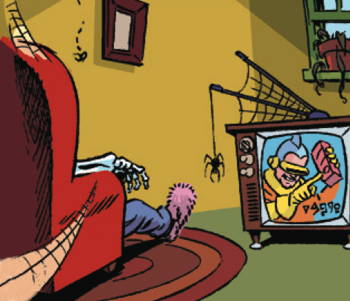February 2023
February 13, 2023
Plant Machete
A machete-wielding plant. From the website of David Bowen, its creator:The Day of the Triffids would have been a gorier novel if the plants had machetes.

via WhatTheyTh!nk
Posted By: Alex - Mon Feb 13, 2023 -
Comments (4)
Category: Art, Botany, Weapons
Geel, Belgium: Eight Centuries of Deinstitutionalized Treatment for Mental Patients
From the Wikipedia page:Geel is well known for the early adoption of de-institutionalization in psychiatric care.[3] This practice is based on the positive effects that placement in a host family gives the patient, most importantly access to family life that would otherwise have been denied. The legendary 7th-century Saint Dymphna, who had fled to the Geel area from Ireland, is usually credited with this type of care. The earliest Geel infirmary and the model where patients go into town, interact with the community during the day, and return to the hospital at night to sleep, date from the 13th century.[4]

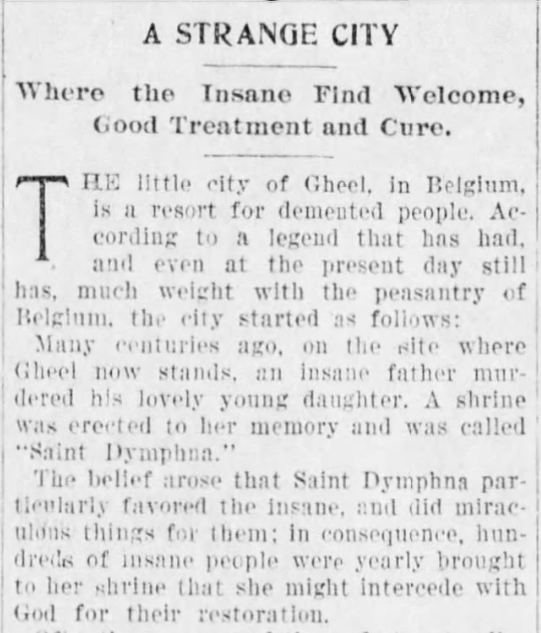
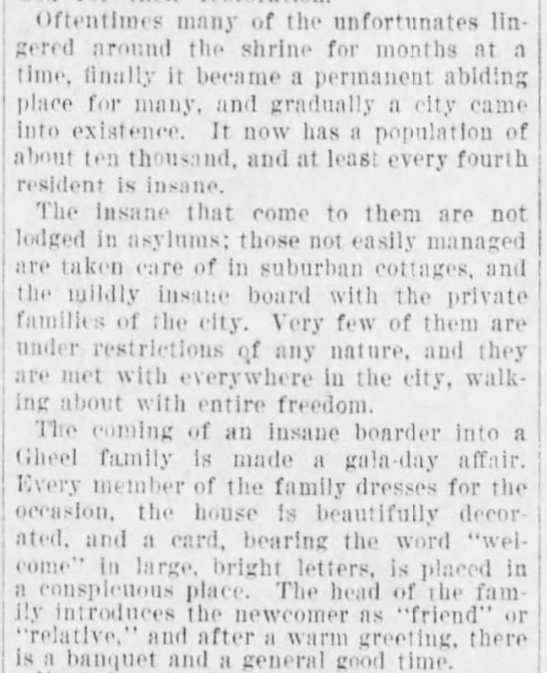
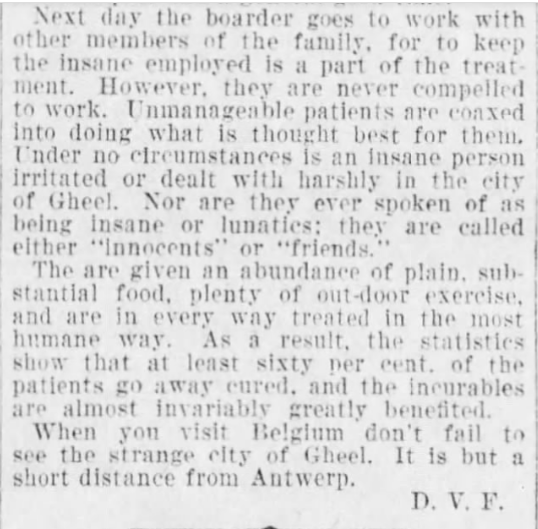
Posted By: Paul - Mon Feb 13, 2023 -
Comments (0)
Category: Communes, Utopias, and Other Alternative Societies, Europe, Mental Health and Insanity
February 12, 2023
Chess Football
Patent No. 5558335. Pretty much like regular chess, but inside a simulated football stadium.
Posted By: Alex - Sun Feb 12, 2023 -
Comments (2)
Category: Sports, Patents
Miss Yashica Gold Venus
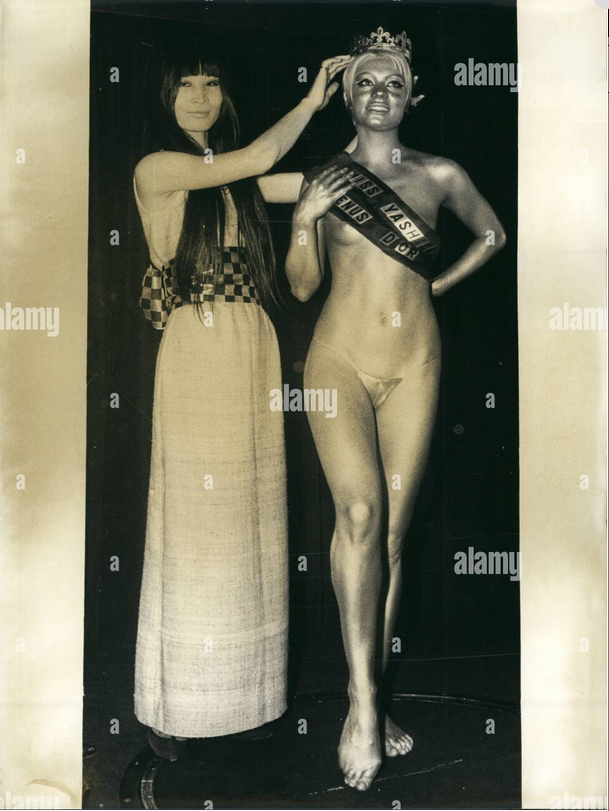
20 year old Lova Moor, Cabaret performer at the Paris ''Crazy Horse Saloon'' was elected ''Miss Yashica Gold Venus'' under the sponsorship of the well launching on the French market of the new Electro 35 Mecanicor Camera produced by Yashica.
Source.
Posted By: Paul - Sun Feb 12, 2023 -
Comments (3)
Category: Awards, Prizes, Competitions and Contests, Beauty, Ugliness and Other Aesthetic Issues, Photography and Photographers, 1960s
February 11, 2023
Garner’s Backward Car
In the early 1970s, artist Philip (now Pippa) Garner converted a '59 Chevy into a "backward car." This involved flipping the body of the car around so that the back became the front. It was fully drivable.Esquire magazine ran an article about it in their Nov 1974 issue. They noted, "Even though the Chevy conformed to highway codes, it was stopped by police on numerous occasions. The car was legal, yes, but hard to handle. After these pictures were taken, Garner buried the car in a secret place, forever."
More info: Redling Fine Art (pdf of Esquire article)
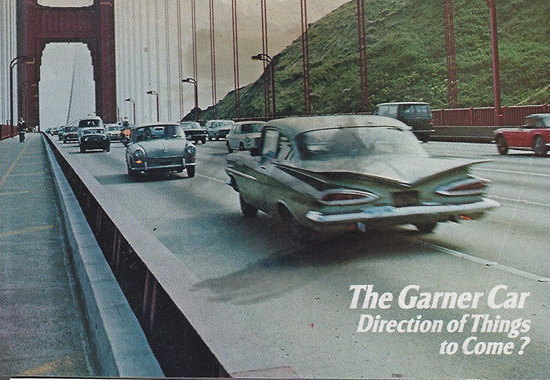
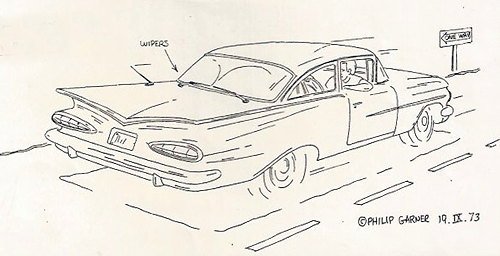
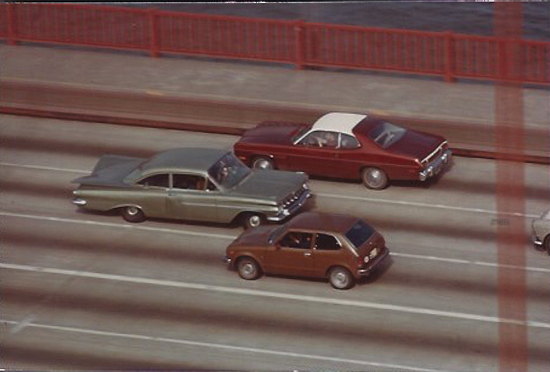
Posted By: Alex - Sat Feb 11, 2023 -
Comments (7)
Category: 1970s, Cars
Fire Chief Speaker Hat
No longer just $3.98.
Posted By: Paul - Sat Feb 11, 2023 -
Comments (2)
Category: Toys, Firefighting, Arson, Wildfires, Infernos and Other Conflagrations, Fossil Fuels, Carbon Footprint, and Climate Change, 1960s
February 10, 2023
True Towel Tales, No. 1
They're laying the beefcake on pretty thick to sell some towels.
Posted By: Alex - Fri Feb 10, 2023 -
Comments (3)
Category: Advertising, Baths, Showers and Other Cleansing Methods, 1940s, Men
Virtue Board Games
I never knew that "Snakes and Ladders" belonged to this category.Read an excellent short history here.
One example, with description taken from this other site:
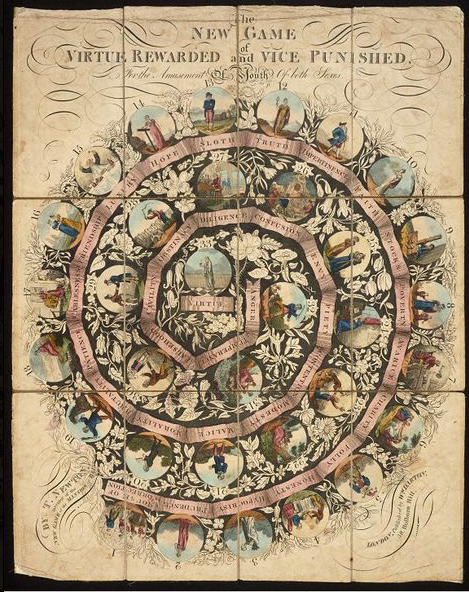
A frankly insane 19th century board game.
The game comes on a series of hand painted paper tiles attached to a thin cloth allowing it to be folded up and put into a drawstring case. When unfolded, it forms a spiral-shaped track on the board going from the outside and running anti-clockwise to the centre. Included are some things to use as counters and a spinner, through which a matchstick can be pushed to form a single-dimensional-rotary d4 equivalent. This is intentional by the makers as they did not want to be seen to be encouraging customers to bring a dice box into private homes. Yes, that is the stated reason as given in the rules to this game, which is described as "for the Amusement of Youth of both Sexes."
Also included are a number of tokens which are handed out to players as they play. Players start at the beginning (i.e. before space 1), roll the dice spin the spinner, which yields a value from 1 to 4 (were d4s available in 1818?), and move that number of spaces. Each space is named with either a Virtue or a Vice and every single one has an effect, usually relating to the rewards that such a virtue might bring (i.e. receiving tokens), or the comeuppance of "the dangerous paths of Vice" which do bad things to the player. Apart from "Hope" which requires the player to "wait with patience until the next turn."
So the players spin, move, and things happen to them, much like the Game of the Goose. It's quite clear from reading the rules, however, that the moral behind the game is highly flawed. Many of the Virtue spaces reward you with "tokens" yet these tokens have zero bearing on the outcome of the game. It is mentioned that the first player to land on the final space (with the whole if you overshoot you must count back rule in effect) "claims the contents of the bank and wins the game" yet there is no indication of what the tokens are for. The first player to the final space, imaginatively named "Virtue," wins regardless of how many tokens everyone has. This means that you could have systematically landed on every vice space imaginable but if you're first to land on the final space exactly, you win regardless of the number of tokens in the bank. The rules also don't specify how many tokens should go in the bank and with the preponderance of "vice" spaces that send you back often a long way, i.e. to "House of Correction" (space 1) or "Stocks" (space 9) a player skilled in fudging spinner spins could well find themselves with an infinite number of tokens. So even if you insert the house rule that the player with the most tokens wins, the player getting to the end "claims the contents of the bank" and therefore has infinity tokens and wins that way.
So what's the real moral message imparted by this game? That stopping to help and be charitable and nice is all well and good but the victory in life goes to whoever barges through the fastest or to the luckiest player. The attempt at inculcating a set of moral values into the youth of both sexes is undermined by the fact that players don't have to make any active choice; at the end of the day, whoever spins the lucky numbers gets the prize at the end of the day.
I can't help but feel that this kid of explains something about Victorian morality though I can't think what.
Posted By: Paul - Fri Feb 10, 2023 -
Comments (0)
Category: Games, Nineteenth Century, Twentieth Century, Ethics and Morals
February 9, 2023
Miss American Fork
Regional beauty titles don't typically strike me as being odd, unless the location is American Fork, Utah, which regularly elects a Miss American Fork. Sounds like she should be paired with Miss Canadian Knife and Miss Mexican Spoon.Below is Miss American Fork of 1967, but the contest continues to this day. Miss American Fork of 2023 will be chosen in June.

American Fork Citizen - Jun 13, 1968
Posted By: Alex - Thu Feb 09, 2023 -
Comments (3)
Category: Awards, Prizes, Competitions and Contests
HemisFair 1968
These types of ancient festivals seem all but extinct, making them seem weird to our 2023 eyes. Will they ever happen again?The Wikipedia entry.
Posted By: Paul - Thu Feb 09, 2023 -
Comments (5)
Category: Regionalism, Expositions, World Fairs, Celebrations, 1960s, Nostalgia, Yesterday’s Tomorrows
| Get WU Posts by Email | |
|---|---|

| Who We Are |
|---|
| Alex Boese Alex is the creator and curator of the Museum of Hoaxes. He's also the author of various weird, non-fiction books such as Elephants on Acid. Paul Di Filippo Paul has been paid to put weird ideas into fictional form for over thirty years, in his career as a noted science fiction writer. He has recently begun blogging on many curious topics with three fellow writers at The Inferior 4+1. Chuck Shepherd Chuck is the purveyor of News of the Weird, the syndicated column which for decades has set the gold-standard for reporting on oddities and the bizarre. Our banner was drawn by the legendary underground cartoonist Rick Altergott. Contact Us |
